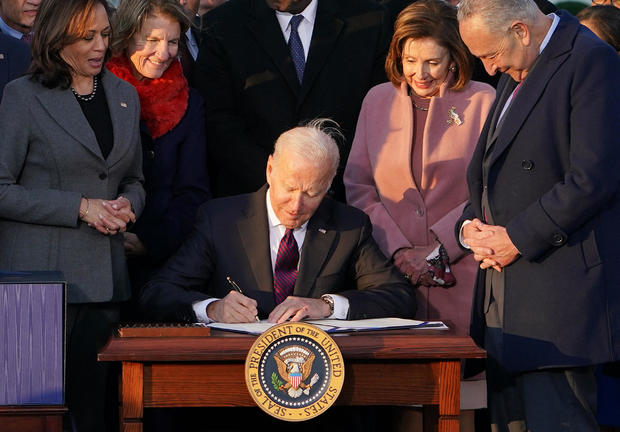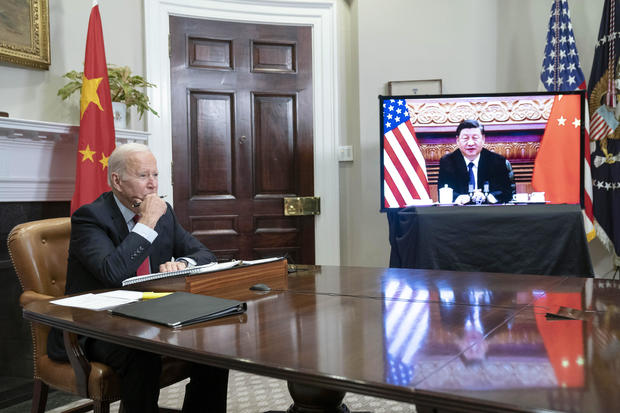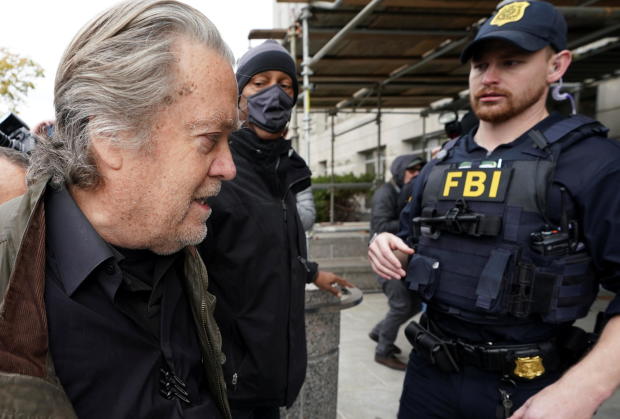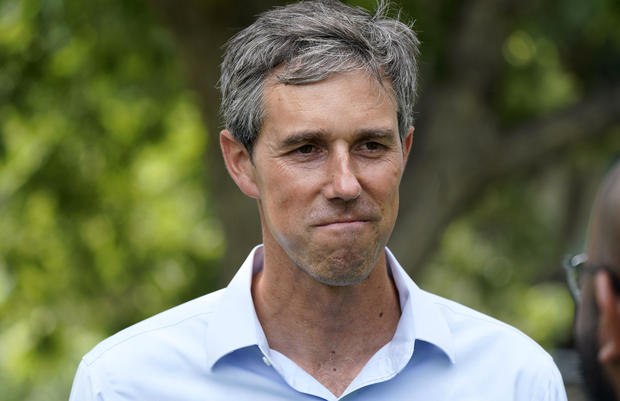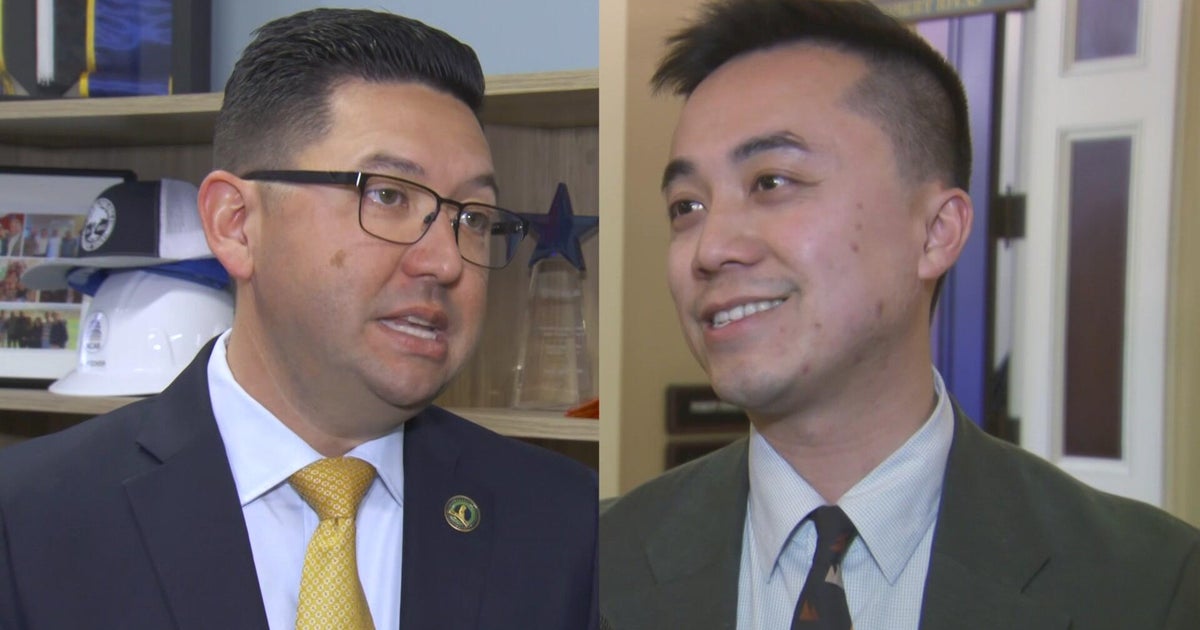Biden signs $1.2 trillion infrastructure bill into law, hailing bipartisan breakthrough
Washington — President Biden signed his $1.2 trillion infrastructure bill into law on Monday, delivering on a major campaign promise that aims to revitalize the nation's roads, bridges, waterways and public transit. On Monday night, Mr. Biden then had his first face-to-face meeting with Chinese President Xi Jinping.
Xi, through a translator, said he was happy to see his old friend. "China and the United States should respect each other, coexist in peace, and pursue win-win cooperation," Xi said.
After the video call, which went longer than expected at 3.5 hours, a senior administration official described it as a "substantial back and forth" that was "respectful and straightforward and it was open," but the White House reported no major breakthroughs during the conversation.
Earlier Monday in a South Lawn ceremony flanked by a bipartisan group of lawmakers, governors, mayors and business and union leaders, Mr. Biden signed the long-awaited infrastructure bill.
"The world has changed, and we have to be ready. My fellow Americans, today I want you to know, we hear you and we see you," the president said on the White House South Lawn before signing the legislation. "The bill I'm about to sign into law is proof that despite the cynics, Democrats and Republicans can come together and deliver results. We can do this. We can deliver real results for real people."
Formally known as the Infrastructure Investment and Jobs Act, the law includes $550 billion in new spending on the nation's physical infrastructure and represents the largest investment in roads, bridges, ports, water and rail in years. The measure provides $110 billion for roads, bridges and major projects, $39 billion for public transit and $66 billion for railways. It also provides $65 billion to expand broadband infrastructure and $55 billion for clear water investments.
"Today, we're finally getting this done. So my message to the American people is this: America is moving again, and your life is going to change for the better," Mr. Biden said.
Mr. Biden earlier signed an executive order establishing a task force to lead the coordination and implementation of the law. The task force will be led by Mitch Landrieu, the former mayor of New Orleans.
Meanwhile, the Congressional Budget Office (CBO) said it would release a final estimate on the cost of Mr. Biden's second signature piece of legislation, the Build Back Better Act, by Friday. While Democratic leaders and progressives had hoped to vote on the social spending package and the infrastructure bill together, the plan fell apart when moderates said they wanted to wait for the CBO score before voting. The CBO score is necessary before any Senate vote on Build Back Better due to budget reconciliation rules.
Democrats will only need a simple majority to pass Build Back Better in the Senate, but since no Republicans are expected to support it, all 50 Democrats will need to vote for it.
Read about the infrastructure bill signing and more headlines from Washington below:
No breakthroughs, but Biden-Xi summit "respectful and straightforward"
President Biden "welcomed the opportunity to speak candidly and straightforwardly" to Chinese President Xi Jinping on Monday night when the two leaders held a virtual summit. The White House said the men sat down for about 3.5 hours for a video call that was divided into two sections, with a break in the middle.
According to the White House readout of the summit, Mr. Biden "underscored the importance of managing strategic risks" with China, and "he noted the need for common-sense guardrails to ensure that competition does not veer into conflict and to keep lines of communication open."
A senior administration official held a call with reporters after the presidents' meeting and said that while there had been no major breakthroughs, it was a "substantial back and forth" that was "respectful and straightforward and it was open."
The official said Mr. Biden had explained America's concerns regarding China's "practices in Xinjiang, Tibet, and Hong Kong, as well as human rights more broadly," but noted that it was clear the two leaders had different world views.
On China's increasingly aggressive stance on self-governing Taiwan, Mr. Biden told Xi that the U.S. "strongly opposes unilateral efforts to change the status quo or undermine peace and stability," reiterating his administration's support for the "one China" policy.
By Arden Farhi and Tucker Reals
Biden hopes he and Xi have "candid" meeting, while Xi says he's happy to see his old friend
At the top of their meeting, President Biden told Chinese President Xi Jinping he hopes the two can have a candid conversation. Mr. Biden said it's their responsibility as leaders that the competition between the two nations doesn't become a conflict, and they need common sense guard reals and to be clear when they disagree.
"We have a responsibility to the world as well as to our people," Mr. Biden said. "It's why we believe, and you and I have talked about this, all countries have to play by the same rules of the road, why the United States is always going to stand up for our interests and values and those of our partners."
Mr. Biden said the two will discuss human rights concerns, as well as security in the Indo-Pacific region.
"We never walk away wondering what the other man is thinking, and I think that's an important ingredient for this relationship," he said.
Xi, through a translator, said he was very happy to see his old friend. He said the U.S. and China face significant challenges together, and need to improve communication and cooperation.
"Right now both China and the United States are at critical stages of development, and humanity lives in a global village and we face multiple challenges together," Xi said.
Xi said he looks forward to a wide-ranging discussion.
"China and the United States should respect each other, coexist in peace, and pursue win-win cooperation," Xi said.
Biden to hold bilateral meeting with Chinese President Xi Jinping
House January 6 committee member Aguilar says "no one is above the law" about Bannon
Congressman Pete Aguilar, a member of the House select committee investigating the January 6 attack, said Bannon's indictment and his court appearance show that "nobody's above the law."
Aguilar warned "there are consequences" to other called witnesses who might want to follow Bannon's lead and not show up.
— Ellis Kim
Kirby says defense secretary has ordered briefing on 2019 Syria strike that NYT reported killed dozens and not properly investigated
The New York Times reported on Saturday that the U.S. military hid a strike that killed dozens of civilians in Syria in 2019. Pentagon spokesman John Kirby said Monday that the defense secretary has asked CENTCOM commander General Frank McKenzie to provide him a briefing on that strike.
Kirby said there are two long-running reviews commissioned by the Pentagon on civilian casualties nearing completion — one is on "civilian harm" done by Defense Department operations and the other is specifically on civilian casualties in Syria.
Biden to head to New Hampshire on Tuesday to promote new infrastructure law
After Monday night's meeting with Chinese President Xi Jinping, President Biden will head to New Hampshire on Tuesday, the White House said. Mr. Biden will travel to Woodstock, New Hampshire, where he will deliver remarks on the NH 175 bridge over the Pemigewasset River, which the White House says has been on the state's "red list" of bridges in poor condition since 2013.
Mr. Biden will head to another swing state on Wednesday to sell the infrastructure plan when he heads to Detroit, Michigan to visit General Motors' Factory ZERO electric vehicle assembly plant. The infrastructure bill has allocated $7.5 billion to build a network of electric vehicle charging stations.
Watch: Biden signs infrastructure bill into law
President Biden signed the $1.2 trillion infrastructure bill into law on Monday, hailing its passage as a bipartisan breakthrough that shows that "America is moving again." The new law provides hundreds of billions of dollars to revamp the nation's roads, bridges, waterways, public transit and broadband infrastructure. Watch his remarks in this CBS News Special Report.
Biden says infrastructure bill shows "America is moving again"
Mr. Biden celebrated the passage of a signature piece of his legislative agenda, thanking mayors, tribal leaders, civil rights leaders, ironworkers, business leaders, Republicans, moderate Democrats and progressives who helped a vision become reality.
The president said he knows Americans are "tired of the bickering in Washington" and "frustrated by the negativity." But that Republicans and Democrats could come together to pass this legislation proved the cynics wrong, he said. The president particularly credited Senate Minority Leader Mitch McConnell and GOP Senator Shelley Moore Capito for their work in getting infrastructure across the finish line.
"Today, we're finally getting this done," the president said. "So my message to the American people is this: America is moving again. And your life is going to change for the better."
The president touted the various components of the legislation, including making high-speed internet more widely available and providing clean drinking water for children. The legislation doesn't increase the gas tax, or increase taxes on anyone earning under $400,000, he said.
During most of the 20th century, the U.S. led on investments in infrastructure, but that tapered off, he said.
"We risk losing our edge as a nation, and China and the rest of the world are catching up," Mr. Biden said, hours before speaking with China's President Xi Jinping.
Next year will be the first year the United States' infrastructure investments will outpace China's, he said.
The president tried to give assurances that the infrastructure funding won't be mismanaged.
Mr. Biden then shifted to the Build Back Better Act, which Pelosi said she hopes the House will vote on this week. The president said he's confident that bill will pass the House and Senate, before signing the bill into law.
Pelosi says Democrats will "hopefully" pass Build Back Better Act this week
House Speaker Nancy Pelosi touted the infrastructure bill's passage and looked forward to the future of the Build Back Better Act.
"This is a great accomplishment," Pelosi said at the signing ceremony at the White House. "And there's more to come. I'm so happy that hopefully this week, we will be passing Build Back Better to give tax cuts to America's working families, to create millions more jobs, to lower health care costs, and all of it paid for by making everyone pay his or her fair share."
Pelosi declared the president's infrastructure bill the biggest and boldest investment in the nation's history, before going into some of the history of the nation's investments in roads, bridges and rail. She also thanked the congressional staff who brought their expertise to the crafting of the bill.
Speaking before Pelosi, Senate Majority Leader Chuck Schumer praised Mr. Biden for the passage of the infrastructure bill.
"To paraphrase one of my favorite former vice presidents, 'it's a big effing deal'," Schumer said, referencing Mr. Biden's famous comment during the signing ceremony of the Affordable Care Act in 2010, when he was vice president.
"If America is to compete in this century, we can't do it with an infrastructure that's stuck in the last century," Schumer said. "This bill can be summed up by a four-letter word: J-O-B-S."
Schumer said the benefits of the bill go "on and on," and thanked his colleagues who pushed the bipartisan accomplishment "over the finish line."
Bannon released on his own recognizance after hearing on contempt of Congress charges
Steve Bannon, former President Donald Trump's one-time chief strategist, appeared in federal court in Washington, D.C., for an initial hearing on two charges of contempt of Congress.
After a hearing lasting roughly 22 minutes, Bannon was released on his own recognizance. The conditions of Bannon's release require him to notify the court if he travels domestically outside the Washington, D.C., area. He is not allowed to travel outside the U.S. without court approval, and he has surrendered his passport. He is due to appear in court next on Thursday, when he will be arraigned on the charges.
Bannon is represented by David Schoen, an Alabama-based attorney who was a member of Mr. Trump's legal team in his second impeachment trial earlier this year. The former president was impeached by the House on a single charge of incitement of insurrection for his role in the January 6 assault on the Capitol and acquitted by the Senate.
Speaking to reporters outside the courthouse, Bannon vowed to fight the charges. "What we're doing is taking on this illegitimate Biden regime," Bannon told reporters. He urged supporters not to "ever let this noise up here take you off message."
CBO to release final cost estimate of Build Back Better Act by Friday
The Congressional Budget Office (CBO) said it expects to publish its complete cost estimate of the president's Built Back Better Act by the end of the day Friday.
The fiscal analysis of the legislation by the nonpartisan office is key to unlocking support from moderate Democrats who demanded to see the estimate before a vote is held in the House. A group of five moderates pledged ahead of the House vote on the infrastructure bill earlier this month to back the sweeping social spending package in its current form as long as the CBO's analysis is "consistent" with budget estimates from the White House.
New infrastructure funding helps expand transit access for people with disabilities
Because of the passage of the new bipartisan infrastructure legislation, nearly $2 billion is coming to transit agencies across the country to help address an accessibility gap.
"We've never had a separate fund set aside for disability access improvements for mass transit stations," Illinois Senator Tammy Duckworth told CBS News in a recent interview. "This is really significant. We are going to see real improvements very soon."
Some 20% of all transit stations in the U.S. are not in compliance with the Americans with Disabilities Act, according to the Federal Transit Administration, because they aren't accessible to people with disabilities. It's a problem that Duckworth, who is a double amputee, knows well.
"I still to this day can't ride the subway in New York. I can't ride the L in Illinois, in Chicago, I can't get around on it very well because half the time there may not be an elevator," told CBS News earlier this year. She explained, "I tried accessing the subway in New York once and could not get on because the elevator was not working, and the next one didn't have an elevator — or the one after that."
The bipartisan infrastructure measure establishes a $1.75 billion five-year grant program for transit and commuter rail agencies to upgrade their stations, and it is based on legislation Duckworth introduced earlier this year.
Read more here.
Biden names task force to oversee infrastructure bill's implementation
Mr. Biden will sign an executive order Monday that outlines six key priorities regarding implementation of the $1.2 trillion infrastructure plan and establishes an "Infrastructure Implementation Task Force" to coordinate implementation across the federal government, the White House said.
The main priorities involve commitments regarding use of federal dollars, job creation and the environment.
The new task force created by Mr. Biden will be co-chaired by Brian Deese, director of the National Economic Council, and Mitch Landrieu, the new White House infrastructure implementation coordinator. Among its members are the heads of the Departments of Transportation, Interior, Energy, Agriculture and Labor, as well as the Environmental Protection Agency and Office of Personnel Management.
Patrick Leahy, the longest-serving senator, won't seek reelection
Democratic Senator Patrick Leahy of Vermont, the longest-serving active member of the Senate, will not seek reelection in 2022, he announced Monday.
Leahy, 81, was first elected to the Senate in 1974 and will retire after serving more than 46 years. He is currently the president pro tempore of the Senate, making him third in the presidential line of succession, and heads the Appropriations Committee, the third panel Leahy has chaired across his career in the upper chamber.
"While I will continue to serve Vermont, Marcelle and I have reached the conclusion that it's time to put down the gavel. It is time to pass the torch to the next Vermonter who will carry on this work for our great state. It's time to come home," Leahy announced during a press conference at the Vermont State House in Montpelier.
Read more here.
Steve Bannon surrenders to face criminal contempt of Congress charges
Former President Donald Trump's one-time top adviser Steve Bannon turned himself in on Monday on criminal contempt charges after he refused to show up for a deposition ordered by the House January 6 committee.
Bannon was indicted Friday by a grand jury on two counts of contempt of Congress. He arrived at the FBI's Washington Field Office and was taken into federal custody Monday morning. He's expected to be arraigned in court later in the day.
Bannon is represented by David Schoen, an Alabama-based attorney who was a member of Mr. Trump's legal team in his second impeachment trial earlier this year. The former president was impeached by the House on a single charge of incitement of insurrection for his role in the January 6 assault on the Capitol and acquitted by the Senate.
Before walking into the FBI office, Bannon addressed his supporters on camera, saying, "We're taking down the Biden regime."
"I want you guys to stay focused," he said. "Stay on message. Remember, signal, not noise. This is all noise. That's signal."
Read more here.
Biden to hold "candid and direct" talks with Chinese President Xi Jinping
Hong Kong — President Biden is scheduled to hold a face-to-face summit with Chinese leader Xi Jinping on Monday. The meeting, via video conference, will be the most significant U.S.-China talks since Mr. Biden took office.
The discussion is to begin at 7:45 p.m. Eastern time, and is expected to last "several hours" with the aim, according to a senior Biden administration official, being to keep the lines of communication between the world's two biggest economies open to ensure that "competition doesn't lead to conflict."
Mr. Biden will be "direct and candid about areas of concern," the U.S. official said. Those areas likely include China's record number of incursions into Taiwan's air defense zone in recent months; human rights issues in Xinjiang, Tibet and Hong Kong, and Beijing's use of economic coercion and cyber technology. Ongoing supply chain issues and trade tariffs are not expected to be a priority during the conversation.
Read more here.
Beto O'Rourke launches 2022 campaign for Texas governor
Former U.S. Congressman and 2020 Democratic presidential candidate Beto O'Rourke announced Monday that he is running for governor of Texas.
His campaign announcement video largely centered around the Texas power grid's failure during a winter storm in February.
"When the electricity grid failed and those in power failed all of us, it was the people of Texas who were willing to put their differences behind them and get to work doing the job at hand, which meant helping our fellow Texans get through that crisis," O'Rourke said. "We did this out of a sense of duty and responsibility to one another. Now imagine if the governor of Texas felt that same way. Well, there's something that you and I can do about that."
O'Rourke is hoping to capture the energy he brought to his 2018 U.S. Senate race, when he lost to Republican Senator Ted Cruz by about 2.5 percentage points. O'Rourke used the momentum from that campaign to launch a run for president in 2020, but after a huge fundraising launch, he dropped out a few months before the Iowa caucuses after his campaign never had significant support in the polls.
Read more here.
Lawmakers, governors, business leaders heading to White House for bill signing
A bipartisan group of lawmakers, governors, mayors and business leaders are set to join the president at the White House for his signing of the bipartisan infrastructure bill, a White House aide said.
Among the members of congressional leadership expected to attend are House Speaker Nancy Pelosi, Senate Majority Leader Chuck Schumer, House Majority Leader Steny Hoyer and House Majority Whip Jim Clyburn.
Democrats on the guest list include Senators Catherine Cortez Masto of Nevada and Raphael Warnock of Georgia, and Representative Joyce Beatty of Ohio. Among the Republicans expected to join are Senators Bill Cassidy of Louisiana, Susan Collins of Maine and Rob Portman of Ohio, and Representatives Tom Reed of New York and Don Young of Alaska.
Governors Kate Brown of Oregon, Larry Hogan of Maryland and John Bel Edwards of Louisiana are also heading to the White House.
Congress faces considerable to-do list with return from recess
While lawmakers are preparing to celebrate the passage of the $1.2 trillion infrastructure plan with the bill signing at the White House, they also have a lengthy list of items to tackle in the final months of the year.
In the Senate, members are expected to take up this week an annual defense policy bill while they wait for the House to clear the broader $1.75 trillion social spending and climate package, Senate Majority Leader Chuck Schumer said in a letter to Democrats on Sunday.
Schumer said he will seek to have a vote on an amendment to the bill, the National Defense Authorization Act, to repeal the 2002 authorization for use of military force in Iraq, which has bipartisan support.
Congress also has until December 3 to pass a bill funding the government or face a partial shutdown. Schumer said key senators have been engaged in negotiations over funding levels, but acknowledged Republican and Democratic negotiators remain at odds. Instead, the New York Democrat said Congress will likely have to pass a short-term measure before September 3 to keep government agencies operating.
Lawmakers are also staring down a December 3 deadline to address the debt limit. Congress last month approved a stopgap bill that raised the debt limit by $480 billion into early December to avoid a default on the nation's debt.
Sinema to attend White House bill signing
A spokesperson for Senator Kyrsten Sinema of Arizona said she would be attending the signing ceremony at 3 p.m.
The White House said a bipartisan group of lawmakers will attend. Although Senate Minority Leader Mitch McConnell voted for the bill along with 18 other Republicans, McConnell said last week that he won't be attending.
Landrieu to be named senior adviser and infrastructure coordinator
The White House announced Sunday that former New Orleans Mayor Mitch Landrieu will be the senior adviser responsible for coordinating for implementation of this historic bipartisan infrastructure law.
According to the White House, Landrieu will "oversee the most significant and comprehensive investments in American infrastructure in generations—work that independent experts verify will create millions of high-paying, union jobs while boosting our economic competitiveness in the world, strengthening our supply chains, and acting against inflation for the long term."
